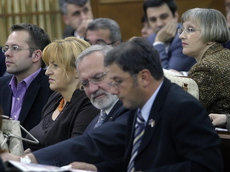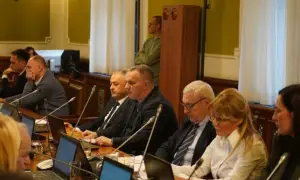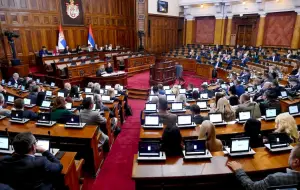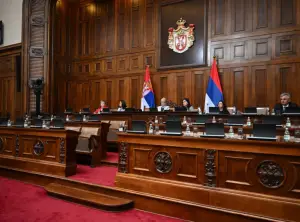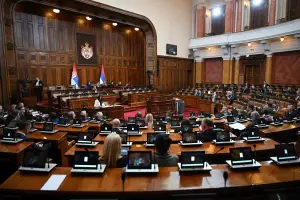Q:
A:
Parliament adopts several laws
Belgrade,
25 May 2006
Members of the Serbian parliament adopted today the National Strategy for Reform of Judiciary which is expected to overhaul the judiciary system, strengthen the legal state and satisfy citizens' needs within a reasonable period of time.
One parliament member voted against the strategy, and 125 in favour.
The Strategy envisages rationalisation of the network of courts, better training of judges and prosecutors and the formation of an administration office, which will prepare the work of the High Judicial Council and enable the planning of the judicial budget.
The Strategy should be implemented by 2011, by which time courts should be made capable of taking care of their financial position on their own.
Parliament members adopted today the Law on organisation of courts which allows district courts to act as second instance courts in certain cases which fall within the jurisdiction of municipal courts.
The Law aims to increase the efficiency of court proceedings and realise the right of citizens to trials of reasonable duration proclaimed by the Council of Europe's Convention for the Protection of Human Rights and Fundamental Freedoms.
The parliament adopted the Law on training of judges, prosecutors, deputy prosecutors and judge’s and prosecutor’s assistants, which introduces additional compulsory training for them. The law will be applied as of March 1, 2007.
MPs also adopted the new Criminal Code, which will allow public prosecutors to carry out an investigation against suspects instead of investigative judges.
Of 129 MPs present, 121 voted in favour of the law, one was against, while seven did not vote.
The parliament also adopted the Law on special authorisations to protect intellectual property. The law will be applied in production, sale, the use and keeping of goods or offering services, hampering the intellectual property for commercial purposes. However, this will not apply to items for personal use.
The deputies also passed the Law on arbitrage, which focuses on resolving property issues.
MPs also adopted a set of financial laws – the Law on securities and other financial instruments, the Law on investment funds, the Law on acquisition of shareholding companies and the Law on accounting and auditing, which should contribute to the capital growth market.
The Law on securities will provide greater safety on the securities market, new instruments and larger authorisation of the securities commission, while the Law on investment funds will allow citizens to take part in the capital market.
Under the new Law on shareholding companies, the price for takeover of shares will have to be the same for all shareholders, which will secure greater protection of small shareholders and more competitiveness.
The Law on accounting and auditing will introduce international accounting standards as well as new institutions, such as the Chamber of Authorised Auditors and the National Accounting Commission.
The parliament also adopted the Law on returning property to churches and religious communities which had been confiscated without any compensation during the agrarian reform, nationalisation and other regulations of state bodies after World War Two.
Out of total of 128 deputies, 126 voted in favour of this law and two deputies did not vote.
According to the Law, things to be returned include agricultural land, forests, forest land, housing and office buildings, apartments and working space, as well movable assets of cultural and historical significance. The Law applies to church property on the territory of entire Serbia, including Kosovo-Metohija.
Serbian deputies adopted today the Law on public ski slopes, which should contribute to the development of Serbian winter tourism and improve safety conditions in ski resorts.
The law differentiates between ski slopes of public importance and local ones. Under the law, the Serbian government is the founder of public ski slopes.
Tourist inspectors will supervise implementation of this law and will fine perpetrators under the Law of tort.
The Strategy envisages rationalisation of the network of courts, better training of judges and prosecutors and the formation of an administration office, which will prepare the work of the High Judicial Council and enable the planning of the judicial budget.
The Strategy should be implemented by 2011, by which time courts should be made capable of taking care of their financial position on their own.
Parliament members adopted today the Law on organisation of courts which allows district courts to act as second instance courts in certain cases which fall within the jurisdiction of municipal courts.
The Law aims to increase the efficiency of court proceedings and realise the right of citizens to trials of reasonable duration proclaimed by the Council of Europe's Convention for the Protection of Human Rights and Fundamental Freedoms.
The parliament adopted the Law on training of judges, prosecutors, deputy prosecutors and judge’s and prosecutor’s assistants, which introduces additional compulsory training for them. The law will be applied as of March 1, 2007.
MPs also adopted the new Criminal Code, which will allow public prosecutors to carry out an investigation against suspects instead of investigative judges.
Of 129 MPs present, 121 voted in favour of the law, one was against, while seven did not vote.
The parliament also adopted the Law on special authorisations to protect intellectual property. The law will be applied in production, sale, the use and keeping of goods or offering services, hampering the intellectual property for commercial purposes. However, this will not apply to items for personal use.
The deputies also passed the Law on arbitrage, which focuses on resolving property issues.
MPs also adopted a set of financial laws – the Law on securities and other financial instruments, the Law on investment funds, the Law on acquisition of shareholding companies and the Law on accounting and auditing, which should contribute to the capital growth market.
The Law on securities will provide greater safety on the securities market, new instruments and larger authorisation of the securities commission, while the Law on investment funds will allow citizens to take part in the capital market.
Under the new Law on shareholding companies, the price for takeover of shares will have to be the same for all shareholders, which will secure greater protection of small shareholders and more competitiveness.
The Law on accounting and auditing will introduce international accounting standards as well as new institutions, such as the Chamber of Authorised Auditors and the National Accounting Commission.
The parliament also adopted the Law on returning property to churches and religious communities which had been confiscated without any compensation during the agrarian reform, nationalisation and other regulations of state bodies after World War Two.
Out of total of 128 deputies, 126 voted in favour of this law and two deputies did not vote.
According to the Law, things to be returned include agricultural land, forests, forest land, housing and office buildings, apartments and working space, as well movable assets of cultural and historical significance. The Law applies to church property on the territory of entire Serbia, including Kosovo-Metohija.
Serbian deputies adopted today the Law on public ski slopes, which should contribute to the development of Serbian winter tourism and improve safety conditions in ski resorts.
The law differentiates between ski slopes of public importance and local ones. Under the law, the Serbian government is the founder of public ski slopes.
Tourist inspectors will supervise implementation of this law and will fine perpetrators under the Law of tort.

